Growing Up With Gore Vidal
In this Truthdig exclusive excerpt from his just-released book, "Point to Point Navigation: A Memoir," National Book Award-winning author Gore Vidal recounts Depression-era episodes of his life involving his grandfather T.P. Gore, the blind senator from Oklahoma, along with a political, economic and existential awakening that followed young Vidal's viewing of "The Prince and the Pauper." Plus: Watch Vidal read a portion of this chapter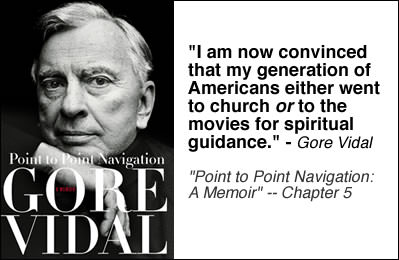
Editor’s note: In this Truthdig exclusive excerpt from his just-released book, “Point to Point Navigation: A Memoir,” National Book Award-winning author Gore Vidal recounts Depression-era episodes of his life involving his grandfather T.P. Gore, the blind senator from Oklahoma, along with a political awakening that followed young Vidal’s viewing of “The Prince and the Pauper.”
Chapter Five
My memory of the Depression is more of talk on the radio and in the house than of actual scenes of apple-selling in the street. Also, I did not always understand what I heard. When stock market shares fell, I thought that chairs were falling out of second-story windows. I did know that senators spent their days in the Senate chamber passing bills — dollar bills, I thought — from one to another, by no means an entirely surreal image.
At the age of five I sat in the Senate gallery and watched as T. P. Gore was sworn in for a fourth term. Defeated in 1920, he had made a triumphant return in 1930. I recall the skylit pale greens of the chamber so like the aquarium in the basement of the Commerce Building. I was also very much aware of my grandfather’s enemy (and my father’s friend and employer), the loudly menacing Franklin D. Roosevelt, with a black spot — like a dog’s — over his left eyebrow. He was always in the papers and on the radio; worse, there he was in practically every newsreel, smiling balefully at us and tossing his huge head about.
Finally, in the spring of 1932, I saw at first hand history before it was screened. A thousand veterans of the First World War had arrived in the capital to demand a bonus for their services in the late and, to my grandfather, unnecessary war. These veterans were known as the Bonus Army, or Boners for short. By June, there were seventeen thousand of them encamped around Washington and in deserted buildings near the Capitol. The city panicked. There was talk of a revolution, like the recent one in Russia, or the one in France, which I knew so well from having seen so many movies.
At first, I thought that the Boners were just that — white skeletons like those jointed cardboard ones displayed at Halloween. Bony figures filled my nightmares until it was explained to me that these Boners were not from slaughterhouses but from poorhouses. My grandfather was against granting them a bonus. A onetime fiery populist from the Mississippi up-country, and a contributor to the only socialist constitution of the fifty states, he had come to the conclusion that “if there was any race other than the human race, I’d go join it.” He was a genuine populist; but he did not like people very much. He always said no to anyone who wanted government aid. On one memorable occasion, the blind senator was denounced to his face by a blind suppliant for federal aid. On the other hand, he believed in justice — due process, anyway — for all, equally.
As the summer grew hotter and the Depression deepened, and Congress debated whether or not to give the veterans a bonus, rumors spread: they had attacked the White House; they had fired on the Capitol; and, most horribly, they were looting the Piggly Wiggly grocery stores. I dreamed of skeletons on the march; of Boris Karloff, too — all bones and linen wrapping.
On June 17, 1932, the Senate met to vote on the Bonus Bill. I drove with my grandfather to the Capitol, sitting beside him. Davis, his black driver and general factotum, was at the wheel. I stared out the open window, looking for Boners. Instead, I saw only shabby-looking men holding up signs and shouting at occasional cars. At the Senate side of the Capitol there was a line of policemen. Before we could pass through the line, Senator Gore was recognized. There were shouts; then a stone came through the open window of the car and landed with a crash on the floor between us. My grandfather’s memorable words were: “Shut the window,” which I did.
Shortly after, the Boners were dispersed by the army, headed by General MacArthur and his aide Major Eisenhower. Guns were fired; there were deaths. The following Sunday, my father and I flew low over what had been the Boners’ encampment at the Anacostia Flats. There were still smoking fires where the shanties had been. The place looked like a garbage dump, which in a sense it had been, a human one.
From that moment on, I was alert to all films about the French and Russian revolutions and, from that day, I have always known that not only could it happen here but it probably would. In the wake of the disorders and discontents of the sixties, soon to rise again in the nineties, this is no great insight. But back then, it was an ominous portent of things to come, and of the fragility of our uniquely founded state in which everyone thought himself guaranteed sufficient liberty in order to pursue happiness on the high Jeffersonian ground that the present belongs to the living. But if the rich are too rich and the poor have nothing to support them in bad times, then how is liberty’s tree to be nourished?
A chill wind went through the Republic. Three years later Social Security was passed by Congress despite the cry of the conservatives that this was godless socialism and henceforth every citizen would be forced to exchange his name for an administrative number. My grandfather asked for the bill to be voted on. His friend, Huey Long, seconded the motion. Then Senator Long voted for Social Security, and Senator Gore abstained.
The children of the famous are somewhat different from the children of all the rest, including those of the merely rich. Until my mother married a second time, there was no fortune in the family. Cunningly, my father managed to lose control of each of the airlines that he had founded; but then he had no interest in money, only in the making of new things. Senator Gore lived on his salary as a senator, $15,000 a year. He was also the first and, I believe, last senator from an oil state to die without a fortune. But though we were relatively poor, I could tell that I was not like the other children because of the questions that my teachers would ask me about my father and grandfather, and was it true what the papers said?
When I asked my grandparents about the newspapers, they replied in unison, “If you read it in the papers, it isn’t true.” But then populists have never had a good press in Freedom’s Land. I was also warned never to answer the questions of strangers, and, of course, I always did. To one reporter, I said that my stepfather could not possibly have been the father of my half sister as he had not known my mother long enough. Although I had no inkling of the facts of life, I had an instinct for the telling detail. Later, at school, when asked what my father did, I said, “He’s in the newspapers.” Which seemed to me a precise way of accounting for his activities as director of air commerce. In 1936 I moved from Rock Creek Park to the house, Merrywood, across the Potomac, and money suddenly hedged us all round. At the height of the Depression there were five servants in the house, white servants, a sign of wealth unique for Washington in those years. My stepfather was an heir to Standard Oil, the nemesis of T. P. Gore and Huey Long. Although I now lived the life of a very rich prince, I was still unconscious of class differences other than the relation between black and white, which was something as fixed in our city then as the Capitol dome, and as unremarkable. But the rock that had landed between my grandfather and me in the back of the car was a sharp and unmistakable signal that there were others who were not, indeed, princes at all; that there were millions of people to whom an old-fashioned word applied — pauper.
Although something of an avatar of Mark Twain, I have never read The Prince and the Pauper, made into a film by Warner Brothers in the thirties.
Lonely children often have imaginary playmates but I was never lonely; rather, I was solitary, and wanted no company at all other than books and movies, and my own imagination. I was Puck; I was a long-dead Egyptian; I was a time traveler to Rome; I was many other selves. But now, suddenly, I wanted to be not Puck, or even Mickey Rooney. I wanted to be the identical twin boys who played the prince and the pauper. I wanted to be myself, twice. I do not dare speculate upon what the school of Vienna — I refer, of course, to the Riding School — would make of this. But I don’t think that my response to the film was unusual, particularly if one were the actors’ age and so could easily identify with the notion of the two as really one and that one oneself, or with the general proposition that a palpable duplicate of oneself would be the ideal companion.
A current pejorative adjective is narcissistic. Generally, a narcissist is anyone better looking than you are, but lately the adjective is often applied to those “liberals” who prefer to improve the lives of others rather than exploit them. Apparently, a concern for others is self-love at its least attractive, while greed is now a sign of the highest altruism. But then to reverse, periodically, the meanings of words is a very small price to pay for our vast freedom not only to conform but to consume.
The childhood desire to be a twin does not seem to me to be narcissistic in the vulgar Freudian sense. After all, one is oneself; and the other other. It is the sort of likeness that makes for wholeness, and is it not that search for likeness, that desire and pursuit of the whole — as Plato has Aristophanes remark — that is the basis of all love? As no one has ever actually found wholeness in another human being, no matter of what sex, the twin is the closest that one can ever come toward wholeness with another; and, dare one invoke biology and the origin of our species, there is always, back of us mammals, doomed to die once we have procreated, our sexless ancestor the amoeba, which never dies as it does not reproduce sexually but merely — serenely? — breaks in two and identically replicates.
Anyway, I thought Billy and Bobby Mauch were cute as a pair of bug’s ears, and I wished I were either one of them, one of them, mind you. I certainly did not want to be two of me, as one seemed more than enough to go around even in a “famous” family. Yet doubleness has always fascinated me, as mirrors do, as filmed images do.
The plot is pure Shakespeare. It is also impure Samuel Clemens — or is he by now entirely Mark Twain? Certainly, he was obsessed by twins, and by the likeness of one to the other. But then what does his pen name mean? if it does not mean two or twain or twin? I often wonder what I might have become if Warner Brothers had filmed not The Prince and the Pauper but that blackest of American “twin” fables, Pudd’nhead Wilson.
Although Errol Flynn is charming as an ideal older brother, I had completely forgotten that he was in the movie. Plainly, I didn’t want an older brother. I was fixated on the twins themselves. On the changing of clothes, and the reversal of roles. On the descent of the boy prince into the life of the poor, which struck many bells for someone who had actually seen the Boners plain. We now know, through such FBI informers as Ronald Reagan, that in the thirties and the forties Hollywood was being infiltrated by the Reds and that writers in the pay of Moscow were subtly poisoning every script that they could with malicious attacks on greed and selfishness and those other traits that have made our country great. It is true, of course, that some of the movie writers were Communists but, as they all agreed in later years, you couldn’t get anything of a political nature into any film. This has also been true in my experience.
On the other hand, it is worth at least a doctoral thesis for some scholar to count how often in films of the thirties and forties a portrait of Franklin Roosevelt can be found, usually hanging on a post-office wall; and then try to discover who put it there: the writer, the director, the producer — the set designer?
At a subconscious level, there was actually a good deal of politics in even the simplest of everyday stories, while historical pieces could always conceal messages, since studios were certain that nothing that happened then could ever have anything at all to do with now. For me, at twelve, the poor of London in their encampment, Robbers’ Roost, were just like the Boners in the Anacostia Flats.
The film’s overt political message is straightforward: a good king will listen to the people and help them. Oddly enough, kings with absolute power were a staple of American movies. One seldom saw democracy in action and, when one did, the results were apt to be simpleminded fables like those of Frank Capra.
More is to be learned, I believe, from William Keighley, auteur of The Prince and the Pauper as well as of Babbitt, than from Capra. The prince’s father, Henry VIII, explains to his son the nature of power. Why the Warner Brothers thought that the American public would find interesting a disquisition on princely power in Renaissance times is a secret that Jack L. Warner took to his grave. On the other hand, the king’s musings were possibly addressed to the serfs at Warner Brothers, a studio known for its love of such traditions as the annual Christmas layoff. The king confides: “Never trust too much, love too much, need anyone too much that you cannot betray them with a smile.” This is true Machiavelli and must have seemed startling to an audience imbued with such Christian values as turning the other cheek while meekly obeying your master. But I am now convinced that my generation of Americans either went to church or to the movies for spiritual guidance. As a third-generation atheist, I was nourished by the screen, and I was particularly struck by the king’s sermon, so like my grandfather’s bleak wisdom. “In politics you must always treat an enemy as if he might one day be a friend, and a friend as if he might one day be an enemy.” My grandfather did concede that he found the second part hard to do, but that did not make it any the less advisable.
The scene that I remembered best was a forest at night, much like A Wood Near Athens. The prince has been taken captive. He is told that he is to be killed right then and there with a knife. The lighting is beautiful, and if television ever decides to paint this black-and-white film, I hope they will use Gainsborough’s delicate earth colors.
There is a startling close-up of the prince’s face as he realizes that he is about to die. Then, invited to pray, he gets off a bold line: he hopes that his father is not watching from Heaven because the king would be ashamed of the treacherous Englishman, but not of his son. I still feel the force of this scene. For the first time, the boy knows that he is about to stop being. Like most children, I often used to imagine what death must be like. But unlike most, I had no belief, or even interest, in an afterlife. To me, if not the prince, death is not being; and that is why for us who know only being, death is literally unimaginable, try as hard as one might to imagine — what? An empty room where one is not? Put out the light and then put out the light? For the young, death is supremely unnatural. For the old, it is so natural that it is not worth thinking about.
As I had never for an instant believed in an afterlife, I suppose that all I could come up with, at twelve, was the formulation that as one was not before birth, one will not be after death, and so there you are, or not, as the case may be. For some, the notion of images impressed on celluloid provides a spurious sense of immortality, as does, indeed, the notion that those light rays which record our images will keep on bending about the universe forever. There are those who find comfort in such concepts. I don’t.
Errol Flynn saves the prince in the wood, and as the pauper is about to be crowned king, the true prince is restored, and all is right with a world where a good boy-king will stand up to evil, whether played by Claude Rains or by Hitler.
So, in a single film, screened at the susceptible time of puberty, one experienced the shock, as it were, of twinship. Also, the knowledge of how to exercise power. Also, the contrast between rich and poor that even I had been made aware of as the Depression deepened, and there was no help on earth for the poor except from the king, if he be good and well-informed. This was much the attitude of the American people at that time to their sovereigns, Franklin and Eleanor, who were opposed, as was the good prince, by evil lords. Finally, there is the impact of imminent death upon a twelve-year-old. Of all the facts of life, death is the oddest. Suddenly, there it is, in a moonlit forest, at the hand of a traitor with a knife; and then no more life. No anything. Nothing.
Underlying the film, there is an appeal to altruism. Now altruism is a brief phase through which some adolescents must pass. It is rather like acne. Happily, as with acne, only a few are permanently scarred. Yet the prince in the film is obliged to note that there are others in the world beside himself (not to mention a pauper duplicate), and to those others he must be responsible. This is a highly un-American point of view but not without its charm for the youthful viewer, who will discover for himself, more soon than late, that one must always put oneself first, except when the American empire requires a war and then, Dulce et decorum est pro patria mori. I believe that my generation of Americans was the very last even to begin to take seriously that once-powerful invocation.
But now the feature film’s over. The newsreel begins. The Japanese sink an American gunboat on a river in China. Senator Gore is defeated for a fifth term. “All is lost,” he declares, “including honor.” The House Un-American Activities Committee is formed. The director of air commerce resigns. The Munich Agreement is signed. Hitler takes over Czechoslovakia’s Sudetenland.
I used to chat with Prince Philip of Hesse, the only person I ever knew who knew Hitler. Philip was son-in-law to King Victor Emmanuel of Italy, and Italy was a founding member — with Germany — of the Axis powers. Prince Philip was always regarded with suspicion by Hitler, and, eventually, his wife, Princess Mafalda, was sent off to a German concentration camp where she died during an air raid — Puccini had dedicated Turandot to her. Prince Philip was rarely revelatory. Like his class, he regarded Hitler as a cheap demagogue, who was bringing a degree of order to the country. I asked about anti-Semitism. Prince Philip said he thought at first it was just pandering to voters. “Later, of course, when friends of mine were proscribed, I tried to intervene. Hitler was always agreeable. He even protected them for a time. But I never got him past his usual point: ‘In the professions they should never number more than their proportion in the general population,’ which made no sense to me.”
Your support matters…Independent journalism is under threat and overshadowed by heavily funded mainstream media.
You can help level the playing field. Become a member.
Your tax-deductible contribution keeps us digging beneath the headlines to give you thought-provoking, investigative reporting and analysis that unearths what's really happening- without compromise.
Give today to support our courageous, independent journalists.
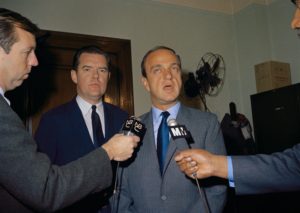
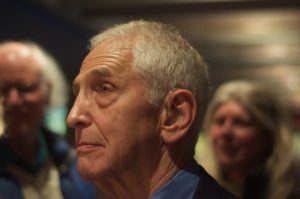

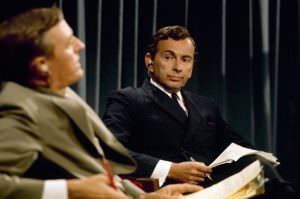

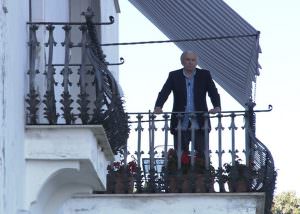
You need to be a supporter to comment.
There are currently no responses to this article.
Be the first to respond.